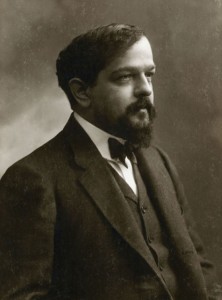Claude Debussy 100
March 23, 2018
On March 25, 1918, 100 years ago this Sunday, French composer Claude Debussy died in Paris, France, at age 55. Debussy was one of the most important composers of his era. His revolutionary treatment of musical form and harmony helped change the direction of music in the early 1900′s.

French composer Claude Debussy helped create new tonalities (relationships among various tones) with such works as La Mer (1905) and Images (1905, 1907). Credit: Public Domain
Debussy felt closer to painters and poets than to other musicians, and he acknowledged the influence of literature and painting on his music. He sought a style of composition that was free from conventional musical forms, and he often used descriptive titles. He is regarded as the leader of Impressionism in music, helping create new tonalities (relationships among various tones).
Achille-Claude Debussy was born in St.-Germain-en-Laye on Aug. 22, 1862. He entered the Paris Conservatory at the age of 10. His major works of the late 1800′s include the String Quartet in G minor (1893) and the three Nocturnes, the first two for orchestra (1900) and the third (1901) for female voices. The popular piano piece Reverie (1890) is from this period, as is the Suite bergamasque (1890, revised 1905). The suite’s popular third movement, “Clair de Lune” (“Moonlight”), is often played separately.
The turning point in Debussy’s career came in 1902 with his opera Pelleas and Melisande. Written as a series of short scenes that end without climaxes, the opera emphasizes natural speech as opposed to brilliant singing. In spite of the controversy caused by its unconventional style, the opera was an immediate success and began an extremely productive period for Debussy. His following compositions greatly expanded previous limits of musical structure and tonality. This period lasted about 15 years and included the orchestral masterpieces La Mer (1905) and Images (1913); the piano works Estampes (Engravings, 1903), Masques (1904), L’Isle joyeuse (The Island of Joy, 1904), two sets of Images (1905, 1907), and two books of Préludes (1910, 1913); and several sets of songs.
In 1909, Debussy suffered the first symptoms of cancer. He died of the disease nine years later. Probably because of his illness, he began working at a much slower pace. He started some operas and other large-scale projects but did not finish them.
From 1913 to 1917, Debussy abandoned Impressionism for a more severe, abstract style. He returned to Classicism with three chamber sonatas. They were the sonata for piano and cello (1915); the sonata for flute, violin, and harp (1915); and the sonata for violin and piano (1917). He also composed his most daring works. They include Syrinx for solo flute (1913), the 12 Etudes for piano (1915), and the ballet Jeux (Games, 1913). Some critics consider the ballet to be Debussy’s finest and most influential work. It was first presented by the famous Ballets Russes, which commissioned the score. The choreography was created by the great Russian dancer Vaslav Nijinsky.


